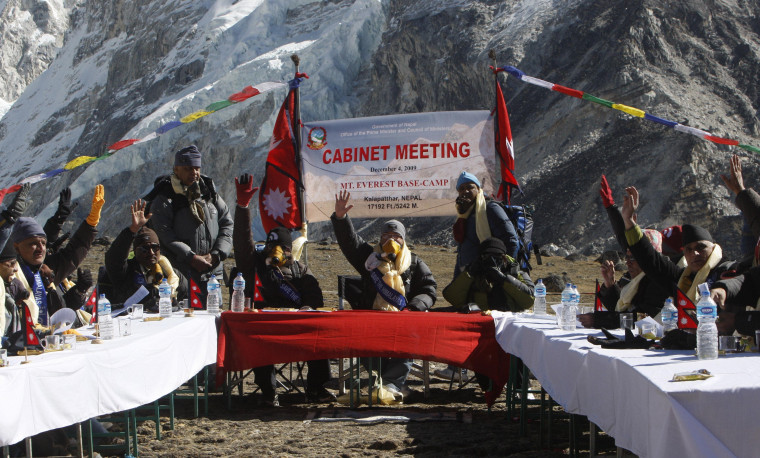Nepal's top politicians strapped on oxygen tanks Friday and held a Cabinet meeting amid the frigid, thin air of Mount Everest to highlight the danger global warming poses to glaciers, ahead of next week's international climate change talks.
The government billed the stunt as the world's highest Cabinet meeting. The ministers posed for pictures, signed a commitment to tighten environmental regulations and expand the nation's protected areas, and then quickly flew away.
"The Everest declaration was a message to the world to minimize the negative impact of climate change on Mount Everest and other Himalayan mountains," Prime Minister Madhav Kumar Nepal later said.
Melting at alarming rate
Scientists say the Himalayan glaciers are melting at an alarming rate, creating lakes with walls that could burst and flood villages below. Melting ice and snow also make the routes for mountaineers less stable and more difficult to follow.
Getting the ministers to the mountain safely required extensive planning.
The prime minister, his two deputy prime ministers and the 20 Cabinet ministers were examined by doctors before boarding helicopters to Kalapathar, a flat area at an altitude of 17,192 feet next to Everest base camp, the jumping point for climbers seeking to scale the peak.
The Himalayan Rescue Association's Bikram Neupane said the politicians — bundled in thick jackets, windproof gear and woolen hats — all had adequate oxygen levels in their blood and they were in no immediate danger.
The Cabinet spent only 20 minutes next to the mountain on a clear, sunny day in an effort to prevent any of the ministers, unused to the heights of the Himalayas, from getting altitude sickness.
Some were overweight ...
Several of the ministers were overweight, some were in their 70s and many came from the low-lying plains in the south. Four ministers declined to attend either because of health concerns or because they were traveling abroad.
Though rescue helicopters were on standby, none of the officials fell ill.
The ministers stayed overnight Thursday in the town of Lukla, about 9,180 feet high, to acclimatize to the higher elevation. They then traveled to Syangboche — 12,800 feet high — where they took the helicopter to the world's highest mountain.
The event came ahead of the international climate change conference next week in Copenhagen, Denmark, and was intended "to get the world's attention on the impact global warming is having on underdeveloped countries like Nepal," Environment Minister Thakur Sharma said.
Nepal's negotiation team in Copenhagen will push for wealthy countries to commit 1.5 percent of their earnings to help poorer nations protect the environment, he said.
Local residents welcomed their guests with cream-colored silk scarves used for auspicious occasions.
"The hills and mountains used to be covered with snow even during the summer. But now snow can be seen only on the higher peaks," said Ngyendon, 66, who like many in the region uses only one name.
"We are glad the government is taking initiatives before it is too late. Usually authorities tend to act only after accidents. We are now hopeful that something might be done," said Mingma, a 47-year-old inn keeper at Syangboche.
There are no climbers during the winter season and most climbing is done during the spring. Kalapathar is considered the best spot to view Everest.
In October, the Maldives held an underwater Cabinet meeting to highlight the danger rising sea levels attributed to global warming posed to the Indian Ocean archipelago.
